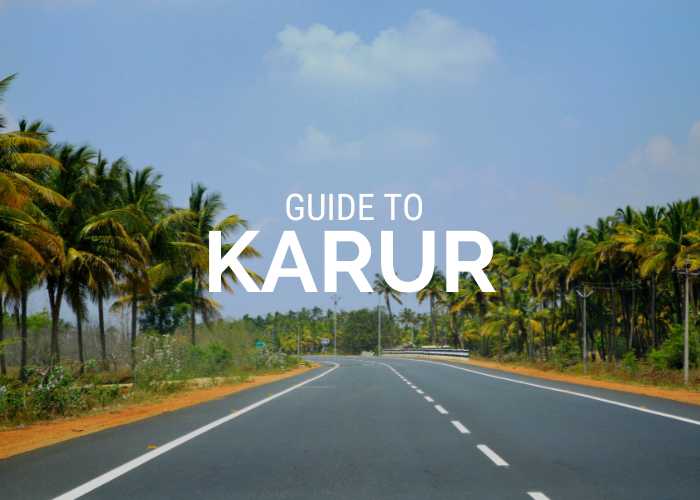
Karur, often referred to as the Textile Hub of South India, is not only known for its rich textile industry but also for its historical significance and picturesque landscapes. This bustling city attracts tourists from far and wide, seeking to witness its architectural marvels, religious sanctuaries, and natural wonders.
Nestled on the banks of River Amaravathi, Karur is a town that dates back to the Sangam period of Tamil literature. It has witnessed the reign of various dynasties, including the Cheras, Cholas, and Pandyas, which have left their imprints on the city's heritage.
To truly understand the essence of Karur, one must delve into its historical background. The city has played a significant role in trade and commerce for centuries, serving as a connecting point between the east and west coasts of southern India. Its strategic location made it a thriving center for business and cultural exchange.
A visit to Karur would be incomplete without exploring the magnificent Karur Fort. Built by the Nayakas of Madurai in the 17th century, this fort stands as a testament to the city's glorious past. The fort's architecture is awe-inspiring, with its imposing walls and intricate carvings, transporting visitors back in time.
Kalyana Venkataramana Swamy Temple, dedicated to Lord Venkataramana, is a sacred place that showcases the architectural brilliance of the Vijayanagara Empire. The temple's grandeur and serene ambiance provide a spiritual retreat for devotees and visitors alike.
Mayanur Naganathaswamy Temple is a hidden gem that mesmerizes visitors with its ancient charm. Dedicated to Lord Shiva, this temple is renowned for its Dravidian-style architecture and intricate sculptures, reflecting the artistic finesse of the Chola dynasty.
Pasupathieswarar Temple, situated on the banks of River Amaravathi, offers a unique blend of natural beauty and cultural heritage. This temple is dedicated to Lord Shiva and showcases remarkable architecture, adorned with intricate carvings and sculptures.
For nature enthusiasts, a visit to the Amaravathi Crocodile Farm is a must. Spread across vast acres of land, this farm serves as a breeding ground for various species of crocodiles. Visitors can witness these majestic creatures up close while also enjoying the tranquil surroundings.
The Karur Reservoir, also known as the Lower Anaicut, is a man-made wonder that enthralls visitors with its serene beauty. The reservoir is formed by the Amaravathi Dam, offering a picturesque setting for boating, fishing, and leisurely walks along its banks.
Nestled amidst the lush greenery of the Western Ghats, Kovai Kutralam Falls is a hidden paradise that rejuvenates the senses. The cascading waterfall, surrounded by verdant forests, creates a soothing ambiance, perfect for picnics and unwinding in nature's lap.
Amaravathi Dam, located on the Amaravathi River, is a splendid sight to behold. This earthen dam provides irrigation water to the fertile lands of Karur and also offers a serene atmosphere for visitors seeking solace in nature's embrace.
Sri Mariamman Temple, dedicated to the goddess Mariamman, is a renowned religious site in Karur. The temple's intricate architecture, adorned with vibrant colors and ornate sculptures, showcases the artistic heritage of Tamil Nadu.
Solaiyur Dam, located near Karur, is a perfect spot for those seeking tranquility away from the bustling city life. Surrounded by lush greenery, the dam offers a serene environment where visitors can relax, indulge in bird-watching, or enjoy a leisurely stroll along the reservoir.
Karur is famous for its textile industry, and a visit to this city is incomplete without exploring its vibrant markets. From traditional handloom fabrics to intricately designed home furnishings, Karur offers a plethora of shopping options that showcase the craftsmanship of the region.
No travel experience is complete without savoring the local cuisine, and Karur has a delectable array of dishes to offer. From traditional South Indian delicacies to mouthwatering street food, the city tantalizes taste buds with its rich flavors and culinary heritage.
Karur, with its historical significance, architectural wonders, and natural beauty, provides a unique blend of experiences for travelers. Whether you are a history buff, a spiritual seeker, or a nature enthusiast, this city has something to offer everyone. Plan your visit to Karur and immerse yourself in the cultural tapestry and captivating landscapes that make it a truly remarkable destination.
Karur is considered a safe city for tourists. Like any other destination, it is always advisable to take general safety precautions, such as being aware of your surroundings, keeping your belongings secure, and following any local guidelines or advice provided.
The best time to visit Karur is during the winter months, from November to February. The weather during this period is pleasant and ideal for exploring the city's attractions. Summers in Karur can be hot and humid, while the monsoon season experiences heavy rainfall.
Karur is well-connected by road, rail, and air.
Yes, Karur offers a range of accommodation options to suit various budgets and preferences. From luxury hotels to budget-friendly guesthouses and lodges, visitors can find suitable places to stay. Some popular hotels in Karur include The Residency, Hotel Hemala, and Hotel NTS Palace.
There are several attractions near Karur that are worth exploring:
Day 1
Day 2
Day 3
Day 4